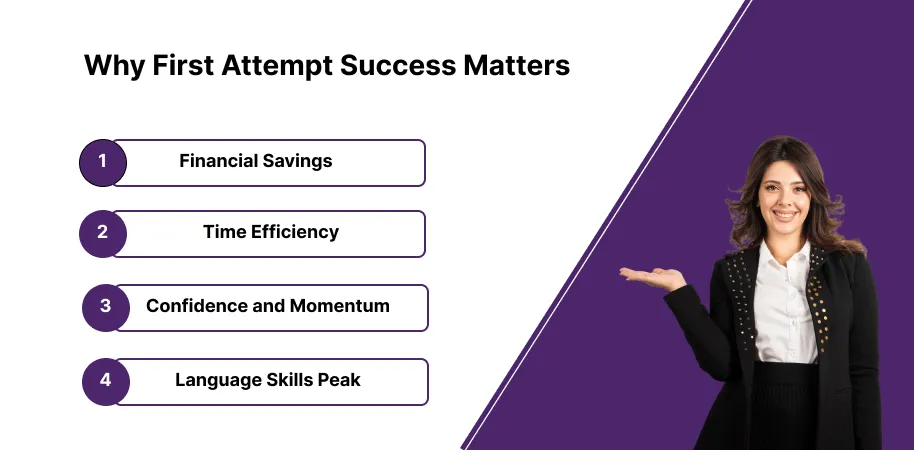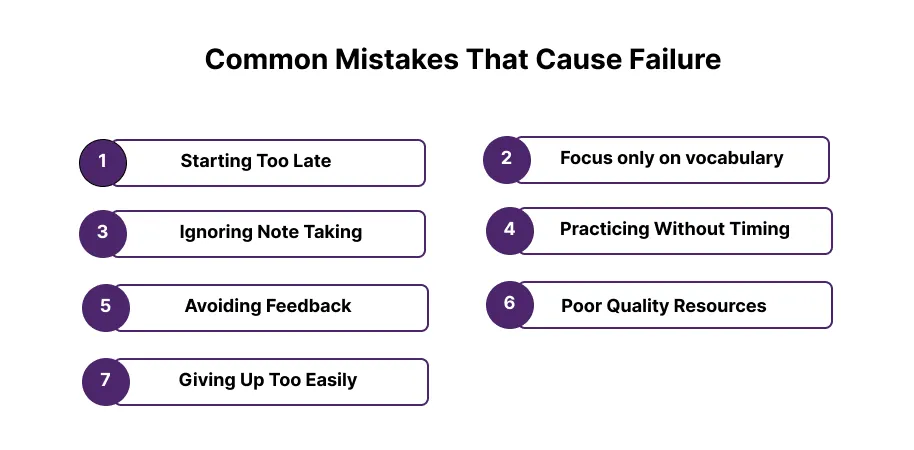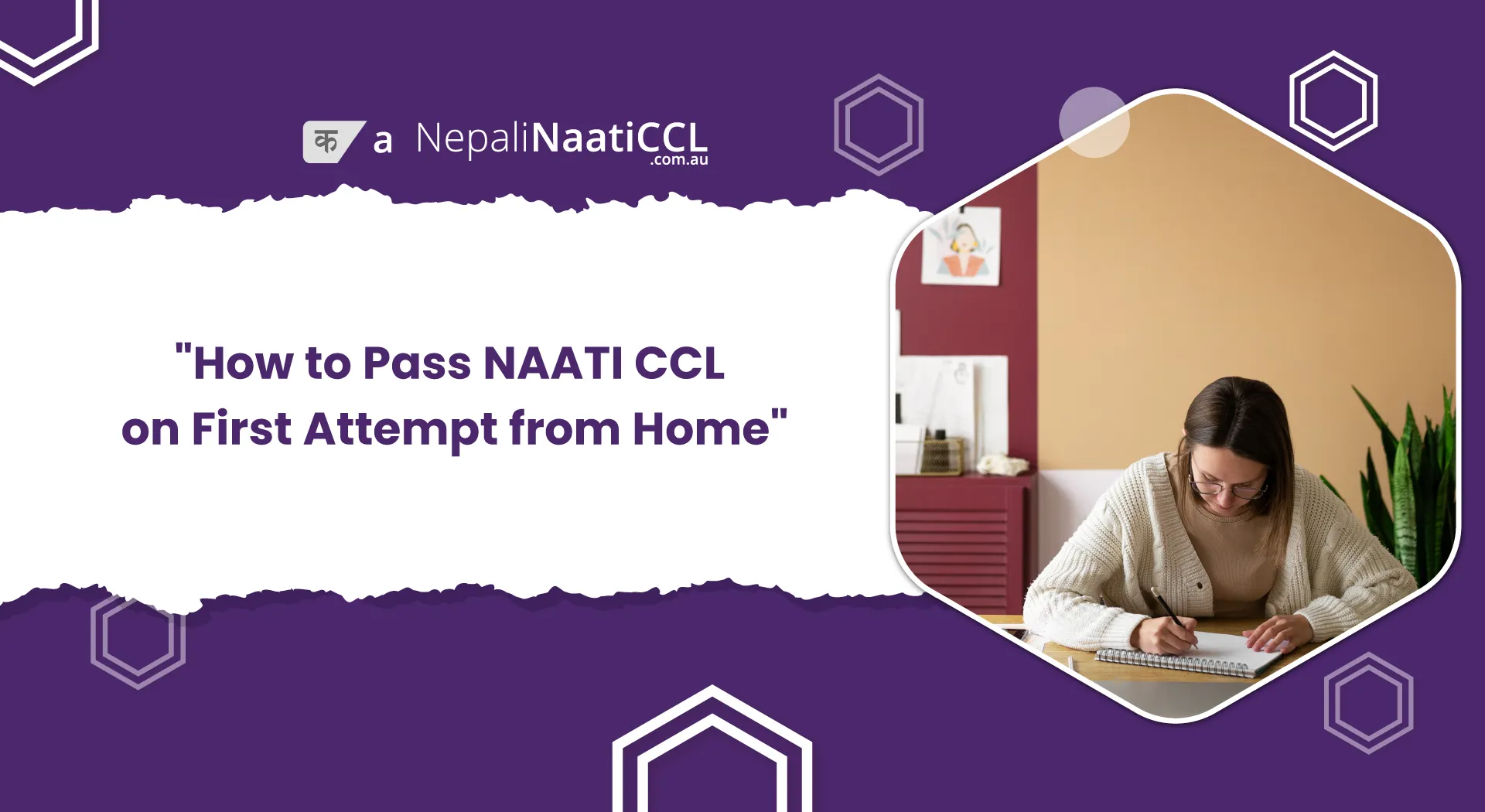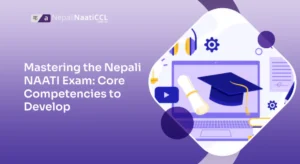Passing the NAATI CCL test on the first attempt is highly possible with the right strategy. More than 60% of highly qualified applicants are rejected on their first attempt, and in this guide, we will illustrate what you need to do if you don’t want to get rejected in your first attempt.
NAATI CCL test grants you 5 precious Australian PR points, which is an important immigration investment. Whether you’re doing an NAATI translation course in Australia or joining NAATI classes, or preparing at home, this ultimate guide includes everything about studying NAATI from home.
Quick Success Summary: The Things You Need To Know
What It Takes to Succeed Before You Dive Deep:
Duration: 3 to 4 Months of consistent practice from the base Level to Understanding concepts.
Daily Study Time: 1 to 2 hours of dedicated studies
Cost: $814 AUD (as of 2025)
PASS score: at least 29/45 points for every dialogue (64% scoring rate)
Skills: Listening, Taking notes, Vocabulary, and Interpreting Accuracy
It’s not just understanding your language; it’s every single one of those practical interpreting skills that you will develop through being prepared using the right NAATI practice material and preparation techniques.
What is NAATI CCL? Understanding the Basics
The NAATI CCL (Credentialed Community Language) is a dialogue interpreting test administered by the National Accreditation Authority for Translators and Interpreters in Australia. In contrast to translation tests (reading and writing), NAATI CCL examines only listening and speaking abilities.
The test assesses your ability to understand spoken English as well as the community language. You’ll also be dealing with everyday circumstances, such as medical appointments, legal consultations, meetings with school officials, and interactions with government agencies.
The only way to score some necessary migration points for the PR visa is to pass this NAATI exam. It is the point that makes the difference between actually getting an invitation to apply or waiting a longer period for 5 PR points.
Your NAATI test is fully online, so you can attend from anywhere with good internet and a quiet place. This versatility allows you to prepare from home or while on the go.
Each conversation will take 4 to 5 minutes and have approximately 300 words. The entire duration of the test is about 35 minutes and consists of technical tests and guidelines.
Learning the NAATI CCL Test Format
Test Structure and Timing
The NAATI exam comprises two independent conversations. Each conversation takes 4 to 5 minutes and is approximately 300 words. The entire test duration is around 35 minutes, including the technical check and directions.
You will be able to listen to two speakers talking about the realistic community situations. The popular conference discussion points are:
- Medical consultations and appointments.
- Community legal services and legal issues.
- Discussions and meetings in schools.
- Banking and financial services.
- Working and work conditions.
- Community and government services.
How Scoring Works
All dialogues are rated based on 45 points, and you must score 29 points in both dialogues to be able to pass the NAATI test. The test evaluators look at three primary areas.
Accuracy: Have you presented all the important information?
Fullness: Have you left out any important information and background?
Quality: Was your interpretation clear and natural?
The absence or improper interpretation of some important details, such as names, dates, numbers, or other important concepts, will lead to the deduction of points. The marking is tough, and that is why comprehensive NAATI preparation is necessary.
Home testing technical requirements are:
Due to the online monitoring of the test, you will need:
- The computer with a good webcam and a microphone.
- Quick and reliable internet connection.
- Ensure that you sit in a bright and large room to have a better view during the test.
- Ensure the ID that you give is authentic and valid.
- Google Chrome browsing (the browser that is usually required).
The test involves the use of online software to monitor you when you are taking the test. You should not end up making your NAATI CCL test date before you have everything in place to take the test.
Why First Attempt Success Matters

Financial Savings
At $814 AUD per attempt, passing first time saves significant money. Many students require 2 to 3 attempts when unprepared, spending $1,600-2,400 unnecessarily. Quality NAATI classes cost less than multiple test attempts while dramatically improving your success chances.
Time Efficiency
Test slots fill quickly, and rescheduling can mean waiting weeks or months. Your PR application timeline depends on getting those 5 PR points. First attempt success keeps your immigration plans on track without frustrating delays.
Confidence and Momentum
Success on your first try eliminates stress and builds confidence in your immigration journey. Failed attempts create psychological pressure that can actually impact your performance in multiple tries.
Language Skills Peak
Your bilingual abilities are likely strongest when you first decide to take the test. Delaying through failed attempts may mean your language skills decline, especially if you’re not using both languages daily in Australia.
Your Complete NAATI Preparation Strategy from Home
Step 1: Identify Your Performance Level
Begin by evaluating yourself. Record your interpretations of sample dialogues and review them carefully. Ask yourself:
- Can I easily understand speakers with various accents?
- Do I know formal and informal vocabulary across various topics?
- Can I remember and interpret detailed conversations without missing key points?
- Am I comfortable with technical terms in healthcare, legal, and financial contexts?
This assessment identifies your weak areas, allowing you to create a targeted study plan. Many professional NAATI classes begin with diagnostic tests for this exact reason.
Step 2: Build Your Vocabulary in a Better Way
A strong vocabulary builds a more accurate interpretation. Make helpful word lists for each NAATI dialogue topic.
- Healthcare: words regarding symptoms, what’s going wrong, treatments, operations, body parts, medicine, and doctor names.
- Legal Terms: words about legal rights, what you have to do, agreements, related to court, advice from lawyers, and important papers.
- Education: words about signing up for classes, what you learn, tests, meetings with teachers, how you’re doing in school, and school rules.
- Financial service: words about bank accounts, spending, loans, how much money you owe, and bank stuff.
- Employment: words about your rights at work, deals, being safe, how you’re doing, how much you get paid, and time off.
Don’t just remember translations. Learn proper uses of words and know when to use them in serious or relaxed situations. Good NAATI practice stuff has these word lists.
Spend 30 minutes each day building your word knowledge, and review what you’ve learned often, so you don’t forget.
Step 3: Make Quick Notes
If you want to stay ahead, you must be able to take notes fast. Make your own shorthand to write notes down quickly:
- Use symbols (like @ for at, or arrows for go/transfer, or pointing to the sky arrows for increase)
- Make up your own short ways to write words.
- Note down names, numbers, dates, places, and amounts.
- Maintain your proper notes on the page at your ease.
- Practice even when you are listening to podcasts, news, or practice tests. Begin at a slow pace, and get faster as you can,
Remember, notes are kept so you can remember key points, so don’t write everything down. Get the main points and the important details.
Step 4: Really Listen Up
Really listening is about focusing on what you’re hearing, getting what it means, and getting ready to translate it right. You learn this by practicing:
- Hear stuff in both languages every day (news, podcasts, talks).
- Copy what you hear right away.
- Listen to native speakers with distinct voices and how quickly they talk.
- Try to get the meaning, what they really want to deliver, not just what they say.
- Train yourself to hear small details.
Being a good listener will put you ahead of the people who aren’t. That’s why good test prep matters.
Step 5: Practice Like a Real Test
Learning the language is just the first step, but it’s not enough on its own. For the real preparation, you need to practice using materials as much as an actual exam as possible. That means working with the same level of difficulty, similar topics, and the kind of conversations you’ll hear during the test.
The practice materials need to have:
- Audio that sounds like the real test.
- Talks about all the usual topics.
- Talks that are the right length and not too easy.
- How they mark you and good answers to read.
- Levels that get tougher as you go
Good courses give you practice materials that are made by people who know everything about the test. These resources show you the exact situations you’ll find in the test, which you may encounter in your NAATI test.
You should practice 2 to 3 talks a day, and test yourself like it’s the real thing. Record and listen to yourself, and see what you missed or where you made errors.
Step 6: Practice Your Mock Test Regularly
Seriously, doing mock tests the right way is super important. Make them as close to the real thing as possible:
- Use the same computer and workspace you’ll use on test day.
- Make sure it’s totally quiet.
- Stick to the same time limits.
- Use the right stuff for notes.
- Keep track of how you did.
After each practice test, take a good look at what happened:
- Where did you mess up and lose points?
- What kind of info was hard to remember?
- What words did you not know?
- How was your speed and time control?
If you’re getting over 29/45 on each dialogue consistently, then you’re all set for the NAATI exam. Don’t book the real test until you’re passing those practice ones regularly.
Creating Your Daily Study Schedule
Consistency beats intensity in NAATI preparation. Follow these scheduling principles:
Daily Structure:
- 30 minutes: Vocabulary building and review
- 30 minutes: Active listening practice
- 30 to 60 minutes: Interpretation practice with dialogues
Weekly Plan:
- 5 to 6 days of focused study
- 1 to 2 rest days for mental consolidation
- One full mock test per week
- Weekly progress review and plan adjustment
Monthly Goals:
- Month 1: Foundation building (vocabulary, note-taking, listening)
- Month 2: Intensive interpretation practice with NAATI practice material
- Month 3: Mock tests and weak area improvement
- Month 4: Final preparation and confidence building
Instead of having a huge goal, try setting smaller ones for each study time. Like, go through 5 health chats or learn 100 legal words.
Track your progress in notes, like Document challenges faced, improvements, and areas needing more focus and practice. This accountability system keeps you motivated and focused.
Common Mistakes That Cause Failure

Starting Too Late
Preparing to take the test about 3 to 4 weeks prior puts you under even more pressure with raw practices. Considering it takes active listening skills, interpretation skills, and vocabulary specific to the topics that you cannot develop without practice, you should start your NAATI preparation at least 3 to 4 months before your test date.
Focus only on vocabulary
Most students will use their time to memorise words, but do not spend any time on the actual interpreting practice. Vocabulary is important; however, it is knowing how to use it correctly under pressure in the NAATI exam that is presented in the test. A good vocabulary-building process comes from having dialogue practice on a regular basis.
Ignoring Note Taking
Some candidates think they can remember through their memory. This strategy fails when dialogues contain multiple names, numbers, dates, and complex details. Develop and practice your note-taking system from day one.
Practicing Without Timing
The NAATI test has strict time constraints. If you only practice untimed, you’ll struggle with the timing during your actual exam. Always time your practice sessions to build comfort with the required speed.
Avoiding Feedback
Practicing without knowing your performance level wastes time. Whether through professional NAATI preparation or honest self-evaluation, you need regular feedback to identify and correct mistakes.
Using Poor Quality Resources
Random YouTube videos and unverified practice materials may not reflect actual test difficulty or format. Invest in quality NAATI practice material specifically designed for the exam.
Giving Up Too Easily
Language skills develop gradually. Some students become discouraged when progress feels slow and quit prematurely. Dedication and consistent effort always give you good results
Essential Test Day Preparation
Technology and Environment Setup
Test your complete setup 1 to 2 days before your NAATI CCL test date:
- Verify internet speed and stability
- Test webcam and microphone functionality
- Confirm your browser is updated
- Close all unnecessary programs and background running applications
- Clear your testing area completely
- Arrange proper lighting
- Inform household members about your test timing
Decide on a checklist and review your checklist items. Technical issues on the test day create unnecessary stress and anxiety, which impact your performance capacity.
Physical and Mental Preparation
The day prior to your NAATI examination:
- Get 7 to 8 hours of quality sleep
- Avoid late-night study(it increases anxiety rather than improving performance)
- Organize identification documents the day before the examination
- Consume a balanced meal prior to the examination
- Drink water, but do not overhydrate prior to the examination
- Do a light review, not an intensive study
On test day, show up at your computer 15 minutes early. This provides a safe buffer for unexpected technical issues as well as mental preparation time.
During the Test
Stay calm and focused throughout your NAATI test:
- Read all instructions carefully before starting
- Listen attentively to each complete dialogue before interpreting
- Use your practiced note-taking system
- If you make a mistake, do not panic; go as smoothly as you can
- Time yourself appropriately (don’t rush or go too slowly)
- Trust your preparation and training
Remember that minor mistakes don’t mean failure. The marking allows for small errors as long as you capture the essential meaning and critical details.
Preparing for the test in only 3 to 4 weeks will put a lot of stress. So, you will need to be very attentive, get things perfectly, and learn the language of the specific topic. The only way to get good at that is through lots of practice. So it is best to start organizing and preparing for the NAATI test at least 3 to 4 months before you are planning on taking the test.
How Nepali NAATI CCL guides you to success:
Getting help from Nepali NAATI CCL can really make a difference if you want to pass the first time:
Full Course: Professionally taught classes that cover all that you need to know for the NAATI CCL exam.
Good Tutors: Learn from tutors who know their level of work and have helped many students pass the NAATI exam on their first attempt.
Lots of Practice: Have access to multiple practice conversations that are just as tough as the actual test.
Help Just for You: Professors will recognize what you’re weaker at and help you get better.
Practice Tests: Practice real-time practice tests to feel more confident and distract you from unnecessary stress about the test.
Learn Online: Study at home when you’re free and get help when you need it.
Good Outcomes: They have a reputation for helping most students pass the test on their first attempt, and this shows that their way of teaching is effective.
A Group to rely on: Meet other students, share experiences, and motivate each other while you study.
It’s less expensive to spend money on a good NAATI course than to waste money on retaking the exam, and it actually increases your odds of passing on your first try.
Conclusion: Your NAATI CCL Success Journey
Getting a first-time pass in the NAATI CCL exam at home is entirely possible with the correct approach. Success involves having three basic elements:
Understanding: Be aware of the test structure, scoring principles, and precisely what is being tested
Resources: Practice using good-quality NAATI practice material that closely represents the exam
Consistency: Practice daily or weekly over 3 to 4 months with a strategic emphasis
Remember, NAATI preparation is investing in your future in Australia. Those 5 PR points can be the difference in receiving that elusive immigration invitation.
Thousands of students become NAATI exam passers annually through strategic preparation methods. With diligence, access to resources, and self-discipline or professional guidance through NAATI classes, you can be among them.
The journey to those 5 PR points is tough but worthwhile. Approach your NAATI CCL test confident, ready, and steadfast so that you may achieve your dream.
Frequently Asked Questions About NAATI CCL
How long does it take to get NAATI CCL results?
Usually, it will take 2 to 3 weeks from your test date. Your Score Report will be sent to your email.
What if I don’t pass the NAATI test?
You may retest after 90 days from your test date. But with good NAATI preparation and proper professional advice, the majority of students pass the test the first time.
How long is the NAATI CCL result valid?
Your NAATI CCL result is valid for three years from the test date, giving you plenty of time to complete your PR application.
Which languages are available for NAATI CCL?
Nepali NAATI offers CCL test materials in over 40 languages, including Hindi, Punjabi, Urdu, Nepali, Mandarin, Vietnamese, Arabic, and many others. Check the official NAATI website( Nepali NAATI CCL) for your specific language availability.
Can I take the test from outside Australia?
Yes, the NAATI test is online, and there should be no issue doing the test anywhere, as long as you have a proper device set up.
Is NAATI CCL harder than IELTS?
It’s tough to say one is harder. NAATI CCL tests how well you can interpret, while IELTS is about your English. Some people find NAATI CCL tricky because you need to be good in two languages, but studying helps a lot.



